PhDs
Here you find an overview of ongoing doctoral research at the Chair of Industrial Design Engineering. These projects are integrated into our research topics and are usually their own or part of a larger research project. Completed doctoral projects can be viewed as full text on the university publication server QuCoSa.
Current doctoral projects
Alexandra Göhring, M. Sc. (Pforzheim University, HEED Institute).
"Building Bridges between Engineering and Design. Influence of knowledge overlap on collaboration and performance in interdisciplinary product development teams."
In the context of my PhD, I am concerned with the question of the influence of knowledge and competence overlaps of engineers and industrial designers on their collaboration and team performance. At the same time, I want to find out how an optimal level of overlap can build a knowledge bridge between the two disciplines to make collaboration in product development as effective as possible.
A first meta-study showed that currently no general statement can be made about the influence of professional and functional heterogeneity in the team. For example, there are team parameters for which an interaction is evident, but also those for which the results are ambivalent. In addition, there are non-linear effects suggesting that an intermediate level of domain and functional heterogeneity is the best configuration for team parameters. Research findings on knowledge overlap also suggest that an intermediate level of knowledge overlap among team members proves optimal for collaboration. Furthermore, it can be assumed that not only the quantity of overlapping knowledge is important, but that the quality also plays a role. Thus, negative effects are to be expected if high-quality technical or expert knowledge does not overlap.
These hypotheses on the quantity of overlapping knowledge are the focus of my PhD project. For this purpose, groups of interdisciplinary engineering and industrial design students with different degrees of knowledge overlap will be compared with respect to their cooperation and performance.
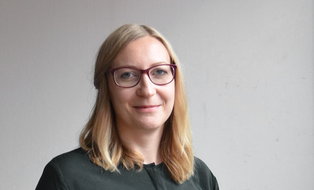 © HS Profzheim
© HS Profzheim
Alexandra Göhring M.Sc.
Hochschule Pforzheim
Dipl.-Des. (FH) Barbara Gröbe-Boxdorfer M. Sc. (HS Pforzheim).
"Integration of sustainability requirements in interdisciplinary product development".
In my PhD project, I am dealing with the topic of sustainability in product development. Many actors from this field feel a certain complexity and information overload. The challenges of their work are thus further increased by increasing sustainability demands. The central questions of my work are therefore:
1. on the basis of which decisions and requirements of sustainable product development do interdisciplinary teams develop their products?
2a. How do they integrate sustainability requirements into the development process and what tools and methods do they use to do so?
2b. What role do sustainability aspects play in the decision for preferred variants in interdisciplinary product development?
3. what is the importance of the use phase and the overall system in which the products are positioned and find their use, already in the early development phase of the products?
In a first preliminary investigation, I conducted thirteen narrative interviews in 2021 with participants from different disciplines as well as different company divisions up to the management. These revealed that, according to the interviewees, it is difficult to change things with regard to sustainability in established products, that environmental compatibility is not part of the objective in product development, that know-how on the subject of sustainability is not always available, and that there is a certain helplessness on this subject.
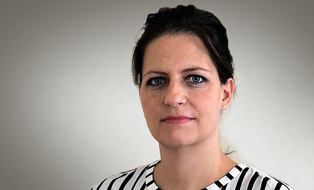 © Hochschule Pforzheim
© Hochschule Pforzheim
Dipl.-Des. (FH) Barbara Gröbe-Boxdorfer M.Sc.
Hochschule Pforzheim
Dipl.-Ing. Emese Papp
"How Does An Exoskeleton Feel? Experience of Occupational Exoskeletons."
As part of my PhD, I am looking at occupational exoskeletons and their effect on users. Exoskeletons are still a rather young technology, but they are gaining more and more importance. With their help, work-related accidents and health hazards as well as absenteeism can be reduced. Unfortunately, research results to date mainly relate to aspects of functionality and usability under laboratory conditions. Physical aspects have so far only been dealt with in terms of ergonomics, and the emotional experience of users has been considered only marginally, if at all. Some studies could show that positive experiences can provide a livable work environment and thus increase well-being, motivation and performance as well as reduce staff turnover. Therefore, I would like to close the above mentioned gaps with my PhD and at the same time find out how design can purposefully influence the different levels of the user experience and influence self-perception as well as the perception of one's own body.
The procedure for this is essentially divided into four steps. In a preliminary study, the needs of the users with regard to exoskeletons in industrial use are to be clarified by means of leading question interviews. The second step aims to create a theoretical basis and validate a framework. For this purpose, the research question was formulated, which are the main dimensions of the user experience of an occupational exoskeleton, especially in relation to physicality. This question will be addressed on the one hand by literature research and on the other hand by an expert workshop. The goal is to develop a conceptual framework for the user experience of exoskeletons that is understandable and comprehensible for developers and users in practice. The third and fourth steps are each formed by a study. The first study addresses the questions of which features of an exoskeleton trigger positive emotions and how physicality affects different levels of user experience. The final study relates to the aforementioned question of how the design influences the experience. For this purpose, the Ottoblock Shoulder exoskeleton is also available as a prototype in two versions. Both versions have the same functionality, but are designed differently.
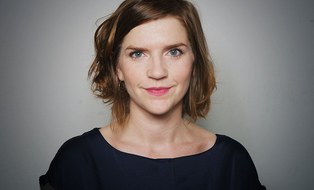 © TD/CPS
© TD/CPS
Dipl.-Ing. Emese Papp B.A.
PhD Student / Research Associate
Send encrypted email via the SecureMail portal (for TUD external users only).
Eva Höfer M.A. (external PhD student, Robert Bosch GmbH).
"Corporate Coworking - Designing an internal corporate coworking space ecosystem to test new forms of work in industrial companies".
In my PhD, coworking spaces (CWS) are in focus. In simple terms, these are shared offices that are used by many independent workers, offer them a space for community and exchange, and are said to have an atmosphere that promotes innovation. Because of these advantages, CWS are now also becoming interesting for companies. For this reason, the "X-Change Lab - Laboratory for Cross-Disciplinary Collaboration" was used as an exemplary prototype at the Robert Bosch Campus for Research and Advance Engineering. The aim here is to investigate whether an in-house CWS - or corporate coworking space (CCWS) - can actually promote the innovative capacity of the employees of an industrial research company. Through literature review, I have already identified requirements for a CCWS. These can be complemented by other elements such as usage rules, tools, events or even a:n corporate coworking community manager:in. Through such a holistic approach, one can develop an in-house and user-centered corporate coworking ecosystem whose impact on employees needs to be investigated.
For my 2021 work, I conducted two investigations. The first investigation was based on a broad literature and internet research to identify corporate coworking approaches, followed by guideline-based interviews with operators:inside of CCWS. In this way, the current state of development and potentials of CCWS but also effects of the Covid 19 pandemic were to be clarified.
The second study focused on the practice of a CCWS and the question of what opportunities an internal CCWS offers employees of a research and advance development company and what can be derived from this for the design of a post-Covid working environment. To this end, interviews were conducted with users of the X-Change Lab.
The results will also be used to derive a recommendation for action for the design of internal company CCW elements.
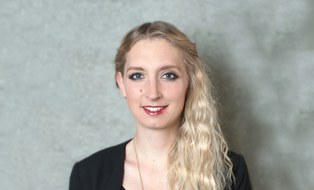 © Eva Höfer
© Eva Höfer
Eva Höfer M.A.
Robert Bosch GmbH
Dipl.-Ing. Tina Bobbe
"The role of the technology demonstrator in the external communication of science"
In my PhD project I am dealing with demonstrators and their potential to bring people in contact with future technologies.
Science communication is important and more relevant than ever. With demonstrators there is the possibility of an interactive medium to bring current science and technologies closer to the general public. This thesis explores the concept of the demonstrator as a design artifact, as well as how demonstrators are experienced in the context of science communication.
For this purpose, literature in the fields of design research, science communication, and museum research was first analyzed and brought together. Next, demonstrator case studies were qualitatively analyzed to develop a demonstrator design framework. Finally, the experience of demonstrators was evaluated in a quantitative field study to understand what effects different demonstrator variations have on the enjoyment, understanding, attitude, and interest of visitors. The goal is to provide scientists with evidence-based design knowledge to use effective demonstrators to engage as many people as possible with future technologies.
 © Technisches Design
© Technisches Design
Dr. Tina Bobbe
Research Associate
Send encrypted email via the SecureMail portal (for TUD external users only).
Lea Schmidt M.A. (external PhD student HSLU Lucerne, Art and Design)
"Mono-material and variety"
In the context of my PhD, I am dealing with the approach of mono-materiality in terms of optimized material circularity.
Different materials are often used to achieve aesthetic or functional contrast in artifacts. This ever-increasing material complexity is a critical obstacle with respect to material circularity. When artifacts are made of a single material, they can be recycled more or less directly into a material cycle, depending on the material. Therefore, the approach of monomateriality is economically and ecologically attractive. Moreover, upon closer examination, it holds an exciting field for design: through targeted design strategies, a great aesthetic and functional diversity can be achieved with a single material.
In my PhD project, I am developing theoretical foundations for a monomaterial approach to design in terms of optimized material circularity. In a feasibility study connected to the dissertation, I was also able to test the approach with an interdisciplinary team in an application-oriented manner using polyester as a material. In the feasibility study, both rigid and flexible material properties were used and combined in artifacts. An outdoor jacket and a backpack were realized as prototypes.
The vision of my project is to achieve a large variance in a material in order to simplify recycling processes and at the same time meet the increasing demands for functional and aesthetic complexity of textile products.
Dipl.-Ing. Lisa-Marie Lüneburg
"Experiencing the Future today: The Role of User Experience Design in the Transfer of Close-to-body Technologies."
In my PhD, I am dealing with the question of which factors are crucial in the development of a Minimal Lovable Product (MLP). MLPs are test products that startups use to find out which criteria a new product has to fulfill so that it not only works, but is also well received by the users and can thus be offered on the market in a promising way. Since there are still very few insights into the characteristics of an MLP, I would like to identify factors based on the methodology of user experience design that make it easier for researchers and developers to develop an MLP efficiently and user-centered.
The focus of this work is on body-worn technology products, as the PhD is running in parallel with the founding of a startup. This is developing smart clothing that uses vibrotactile feedback to support the execution of movements - for example, in physical therapy to treat back pain or in yoga. As body-worn technologies are likely to be used more in the future and there has been little research on their effects (especially on the body), the work offers great potential to provide new insights for the design of such products.
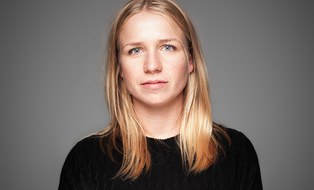 © Frank Mühlbauer
© Frank Mühlbauer
Dipl.-Ing. Lisa-Marie Lüneburg
Team-Lead, Research Associate
Send encrypted email via the SecureMail portal (for TUD external users only).
Dipl.-Ing. Lenard Opeskin
"Participatory Boundary Prototyping as a Transformative Practice in Real Labs"
In my PhD, I investigate to what extent participatory design prototyping is a suitable practice for transdisciplinary research in real labs. In real labs, solutions for complex societal problems are developed in locally limited dimensions, which can either be scaled up or transferred to other areas. In the form of transdisciplinary research processes, "knowledge that guides action" is co-produced by actors from science and society. The solutions developed in the real laboratories and the co-produced knowledge are intended to help transform socio-technical systems into sustainable configurations, for example.
With regard to the suitability of participatory design prototyping for transdisciplinary research, the question arises how the various actors negotiate social problems in their complexity through prototyping (system knowledge) and jointly develop desirable futures (target knowledge). Furthermore, I want to shed light on how boundary objects emerge within this process, at which the actors, despite heterogeneous perspectives, jointly formulate steps towards desirable futures (transformation knowledge) and which are supported by all actors.
In the context of this dissertation project, I am conducting two investigations. The qualitative and explorative preliminary investigation deals with the topic "Participation formats and participatory design prototyping in real laboratories or transdisciplinary research on sustainability transformations" and consists of semi-structured guided interviews with eight to twelve researchers. The main investigation is designed as a participatory observation of boundary object prototyping in transdisciplinary research process. Focus groups with participating actors will be formed on the prototypes generated.
 © Lenard Opeskin
© Lenard Opeskin
Research Associate
NameDipl.-Ing. Lenard Opeskin
Research Associate
Send encrypted email via the SecureMail portal (for TUD external users only).
Nikolas F. Neumann, M. Sc.
"Behavioral economics and sustainable product design -
Integration of behavioral economics and quantitative evaluation methods in the practice of sustainable product design"
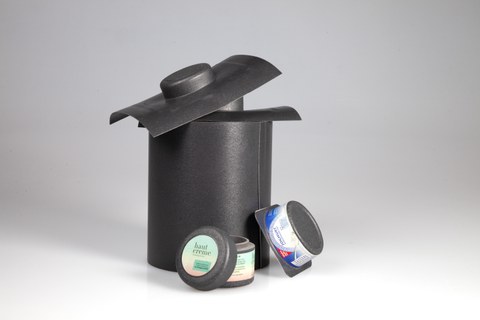
Rezyklatbasierte Lebensmittel- und Kosmetikaverpackungen
My doctorate deals with the question of whether psychological principles (especially from behavioral economics) can be used to encourage a more ecological approach to products. To this end, concrete interventions in the field of PCR plastics with a focus on packaging are developed and then evaluated qualitatively and quantitatively.
The starting point of the work is the impact of man-made climate change and other ecological problems, such as the extinction of species or the pollution of the oceans by plastic, which make a far-reaching ecological structural change necessary. In order to achieve this goal, the international community wants to use the tools of behavioral economics as part of the Sustainable Development Goals to encourage sustainable behavior and make environmentally harmful behavior less likely.
Behavioral economics researches the extent to which people make decisions on the basis of rational factors and which factors that are actually irrelevant for a rational decision exert an influence. The application of these research findings in the field of sustainability, known as "green nudging", has shown considerable success in many cases.
Research is also being carried out in product design into how products can be designed in such a way that they encourage environmentally friendly use or do not trigger environmentally harmful behavior. This branch of research is called Design for Sustainable Behavior (DfSB). The doctorate follows on from this area.
DfSB has developed various intervention techniques to encourage sustainable product use. However, these techniques do not refer to an underlying theory. Therefore, the field has difficulty justifying the selection of certain techniques. In addition, the strategies of behavioral economics have not yet been taken up. Subsequently, behavioral economics forms the first orientation point of the work to develop theory-based interventions.
In addition, the techniques provided in the DfSB have not yet been tested for their effectiveness and specific practical interventions have not yet been quantitatively evaluated. Accordingly, the evaluation of developed design interventions using statistical methods represents the second pillar of the doctorate.
Last but not least, the concept of environmental impact, which in the DfSB refers almost exclusively to CO2 emissions, is to be broadened and the spectrum of possible areas of intervention extended. Ecodesign in particular offers research potential here.
 © Technisches Design
© Technisches Design
Nikolas Neumann M. Sc.
Research Associate
Send encrypted email via the SecureMail portal (for TUD external users only).
Dipl.-Ing. Max Pötter
"Evaluation of the user experience of robot teaching systems for non-experts in industry and trade"
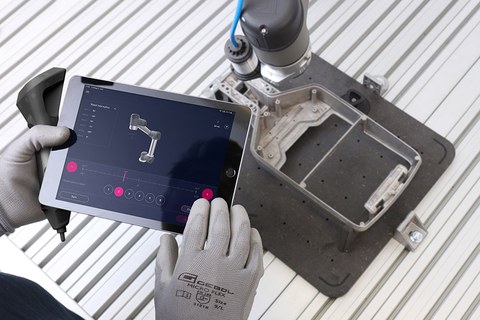
A Robot Teaching system for intuitive robot programming
As collaborative robots (cobots) become an integral part of various industries, the need for intuitive and efficient programming methods (robot teaching) is of utmost importance. Current Robot Teaching (RT) methods often struggle with non-experts, as researchers and developers lack an effective evaluation method to incorporate user insights into their development processes.
My research aims to address this gap by developing a validated user experience evaluation model specifically for robot teaching systems. One focus of my work is to understand the interactions between different user experience factors, such as trust, safety and emotional responses, which are often selectively evaluated but need to be fully considered for effective user experience evaluation. At the same time, the method must be easy to use for researchers and developers of robotic systems, so a balance must be struck between comprehensiveness and effectiveness.
Ultimately, my goal is to provide professionals with tools to effectively gain insights about users and improve their systems to enable positive user experiences. By doing so, organizations can increase the adoption of cobots in professional environments, reduce physical workload and free employees from repetitive tasks, contributing to a better quality of life for employees while increasing productivity. My research aims not only to improve the usability of RT systems, but also to promote a future in which robots and humans work together efficiently and make the most of each other's strengths.
Information for interested parties
Als Einrichtung der Technischen Universität Dresden betreiben wir Designforschung nach wissenschaftlichen Maßstäben. Einzelne Forschungsvorhaben werden im Rahmen von Promotionsvorhaben durchgeführt, womit mit erfolgreichem Abschluss der akademische Grad »Dr.-Ing.« erworben wird. Dabei gehen wir weniger der Frage nach, wie Designforschung zu definieren sei, sondern adressieren für die Disziplin relevante Fragestellungen mit wissenschaftlicher Forschung, die auch praktische Entwurfsanteile enthalten kann. Eine Promotion ist im Verständis unserer Promotionsordnung der individuelle Nachweis von »über die [Diplom-/Master-] Prüfung hinausgehende wissenschaftliche Bildung im Wissenschaftsgebiet und […] besondere Befähigung zu selbständiger wissenschaftlicher Arbeit«, die im Rahmen der Dissertation erbracht wird. Dabei müssen die Ergebnisse »die Entwicklung des speziellen Wissenschaftsgebietes, seiner Theorien und Methoden fördern« – also neue Erkenntnisse zum Design, seinen Theorien oder Methoden bieten.
Die Promotion im Design wird an der Fakultät Maschinenwesen nach der dort gültigen Promotionsordnung durchgeführt. Die Voraussetzung zur Zulassung ist in der Regel ein mindestens mit der Note »gut« abgeschlossenes Hochschulstudium (300 ECTS) oder ein »sehr gut« abgeschlossenes Fachhochschulstudium mit einem Mindestanteil an technischen Fächern. Details zu den formalen Voraussetzungen können mit uns unbürokratisch geklärt werden.
Die Promotionsvorhaben werden eng betreut und folgen einer bewährten Struktur für empirische Forschungsvorhaben. Für unsere Promovierenden finden regelmäßig zweitägige Kolloquien statt, wir organisieren Schreibwerkstätten und -klausuren und bieten ein umfangreiches methodisches Weiterbildungsangebot an. Die Promovierenden können die hervorragenden Angebote unserer Graduiertenakademie in Anspruch nehmen. Die Promovierenden präsentieren ihre Vorhaben auf nationalen und internationalen Konferenzen und erhalten dort zusätzliches Feedback.
Wenn Sie sich für ein Promotionsvorhaben zu menschzentrierter Technikentwicklung, Mensch-Technik-Interaktion, Circular Design oder verwandten Themen an der TU Dresden interessieren, kontaktieren Sie uns gern!
 © TU Dresden
© TU Dresden
Prof. Dr.-Ing. Jens Krzywinski
Head of Industrial Design Engineering
Send encrypted email via the SecureMail portal (for TUD external users only).
